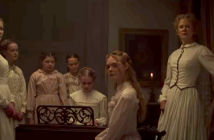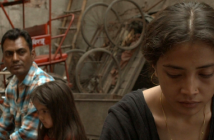
Editor’s Note: The following review is part of our coverage of TIFF’s film series The Wind Will Carry Us: The Films of Abbas Kiarostami. Film scholar Kaveh Askari will introduce Close-Up on March 1st with a discussion on cinema and celebrity in Iran, and how the success of reflexive documentary filmmaking came at a pivotal moment in the country’s cinematic history. For more information, visit tiff.net and follow TIFF on Twitter at @TIFF_NET.
It’s very rare that a movie itself will feel alive with some sense of self-awareness. Much of the time we read a film as a reflection of the actors, the screenwriters, the surrounding socio-political climate, or most often that of the director. Yet despite the indelible touch of Iranian director Abbas Kiarostami on his 1990 masterpiece Close-Up (and his actual presence in a scene), the film stands alone as a document of passionate filmmaking. When the screen ends on a freeze frame, we’re left to reflect on many things: the reconciliation of one’s karma with the universe, the outlandishly incredible filmmaking capabilities of Kiarostami, and especially the psyche of one important individual: Hossain Sabzian.
Close-Up has over time been described as a docu-fiction, an intimate blend of primary accounts and secondary re-enactments that are mixed with a seamlessness that is practically unheard of.
Sabzian (here playing himself) is a puzzle, and his case becomes the muse of the famous director. Over the course of several weeks, Sabzian impersonates Iranian director Mohsen Makhmalbaf (himself), and pretends to be planning a film shoot in the house of the Ahankhah family (themselves) in northern Tehran. Despite forging a close friendship with the family, they eventually become aware of his impersonation, and have the man arrested for fraud (but importantly, not burglary). Close-Up follows this story from the moment Sabzian meets Mrs. Makhmalbaf on public transit to the very end of his trial and beyond, yet not always in chronological order. Indeed, upon release in 1990, Kiarostami’s film garnered much support thanks to the complicated and intriguing time jumps.
 For anyone who hasn’t seen the film, this plot summary explains just the half of it. Kiarostami’s source material is indeed based on a real-life event, the story having been originally published in Sorush magazine by writer Hassan Farazmand (who plays himself in the film). Close-Up has over time been described as a docu-fiction, an intimate blend of primary accounts and secondary re-enactments that are mixed with a seamlessness that is practically unheard of. The courtroom scenes are real, while the rest are constructed with all the necessary pieces to give the final scene a punch which is remarkable in its simplicity.
For anyone who hasn’t seen the film, this plot summary explains just the half of it. Kiarostami’s source material is indeed based on a real-life event, the story having been originally published in Sorush magazine by writer Hassan Farazmand (who plays himself in the film). Close-Up has over time been described as a docu-fiction, an intimate blend of primary accounts and secondary re-enactments that are mixed with a seamlessness that is practically unheard of. The courtroom scenes are real, while the rest are constructed with all the necessary pieces to give the final scene a punch which is remarkable in its simplicity.
And as remarkable as many of the re-enactments are, the courtroom proceedings (which Kiarostami somehow had access to) are without a doubt the highlight of the film. Sabzian is here captured in a close-up, with the camera tracing every line in his face. Regret, confusion, sorrow; all these emotions flash to varying degrees throughout the proceedings, as the Ahankhah family and even his own mother weigh in on his love for truth, cinema, and his own humanity. Sabzian is an admitted cinephile, which is both an important detail in his trial as well as the reasoning for Kiarostami’s interest in the case upon reading Farazmand’s article. In several long takes, we’re implicitly asked to judge Sabzian’s actions based on his own reactions to questioning in the courtroom. Several times, the judge (playing himself, this portion being a documentary) asks point blank why Sabzian wished to impersonate the film director Makhmalbaf. Sabzian perhaps never gives a direct answer, yet throughout the trial, we’re given a front-row seat to the mind of an ordinary, movie-loving, working-class Iranian man.
Kiarostami, despite a strong voice at a pivotal time of the event’s unfolding, largely allows the film to proceed unimpeded by the emotions of a third party.
From this ordinary man comes an incredible testament to the potential of filmmaking. Kiarostami, despite a strong voice at a pivotal time of the event’s unfolding, largely allows the film to proceed unimpeded by the emotions of a third party. When the last scene begins to unfurl, we’re left completely to our own devices: how do we feel about Sabzian, through his pleas of regret? Is he a simple man playing make-believe to con a wealthy family out of some petty cash? Or is he a misguided artist, unable to tap his talent through productive and traditional employment? During Sabzian’s last show of regret and sorrow at the close of the film, it’s impossible not to feel at least a twinge of empathy for his wayward conscience, even if none of these other questions are ever fully answered.
Based on a real-life event, Abbas Kiarostami's masterpiece Close-Up is an intimate blend of primary accounts and secondary re-enactments, giving the final scene a punch which is remarkable in its simplicity



